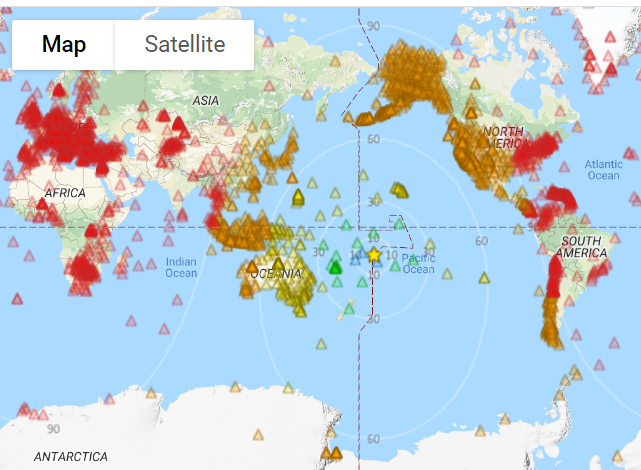![]() @RichardCollins Indeed that would be very useful, however there are bandwidth constraints currently. However we have iqzip project https://gitlab.com/librespacefoundation/sdrmakerspace/iqzip that there are thoughts to use it in the future.
@RichardCollins Indeed that would be very useful, however there are bandwidth constraints currently. However we have iqzip project https://gitlab.com/librespacefoundation/sdrmakerspace/iqzip that there are thoughts to use it in the future.
 @Pierros Papadeas What does it take to have one of those gracious dots on my location?
@Pierros Papadeas What does it take to have one of those gracious dots on my location?
 This is a graph or observations per time, over the last 5 years (almost since we won the Hackaday Prize)
This is a graph or observations per time, over the last 5 years (almost since we won the Hackaday Prize)


 that's great
that's great
 @Taiwo https://wiki.satnogs.org/Build :) also join us on community.libre.space and feel free to ask any questions on how to get started
@Taiwo https://wiki.satnogs.org/Build :) also join us on community.libre.space and feel free to ask any questions on how to get started
 @fredy @Pierros Papadeas I am tracking the established VLBI and radio astronomy networks, the GPS networks for geophysics and meteorolgy. The power system low frequency networks, electromagnetic interference groups, infrasound and earthquake early warning, magnetometer networks, gravimeter networks. And many more. They ALL have to subtract electromagnetic, electic field and magnetic field variations.
@fredy @Pierros Papadeas I am tracking the established VLBI and radio astronomy networks, the GPS networks for geophysics and meteorolgy. The power system low frequency networks, electromagnetic interference groups, infrasound and earthquake early warning, magnetometer networks, gravimeter networks. And many more. They ALL have to subtract electromagnetic, electic field and magnetic field variations.
 @Taiwo generally speaking the simplest station would be an RPi4 with an rtl-sdr and a turnstile antenna
@Taiwo generally speaking the simplest station would be an RPi4 with an rtl-sdr and a turnstile antenna
 ^^ and build up from there, add improvements over time
^^ and build up from there, add improvements over time
![]() any project at Argentina?
any project at Argentina?
 @newen we need more stations in Latin America ;)
@newen we need more stations in Latin America ;)
 we have just a couple of ground stations there.. you can see them clicking on "map" at https://network.satnogs.org/stations/
we have just a couple of ground stations there.. you can see them clicking on "map" at https://network.satnogs.org/stations/
![]() we are at center or AR
we are at center or AR
 Having the data in human readable format is crucial. Proprietary binary formats, undocumented formats and undocumented processing steps, and proprietary software and development environments are a NO NO. All these networks can work together.
Having the data in human readable format is crucial. Proprietary binary formats, undocumented formats and undocumented processing steps, and proprietary software and development environments are a NO NO. All these networks can work together.
 we will be launching a request for translation help in localizing our projects, which should help in places like that
we will be launching a request for translation help in localizing our projects, which should help in places like that
 @RichardCollins absolutely!
@RichardCollins absolutely!
 @RichardCollins couldn't agree more on the necessity of documentation and openness.
@RichardCollins couldn't agree more on the necessity of documentation and openness.
For that reason we published our Libre Space Manifesto

https://wiki.satnogs.org/Build
Build
Building a ground station need not be complicated. There are a few things to consider when working out what it is you are going to do. Choices such as the desire to have a fixed or steerable ground station will play a big part in the amount of equipment needed and the time taken as well as the complexity of any build.

https://manifesto.libre.space/
Libre Space Manifesto
Space is humanity's future. It is humanity's opportunity to explore, develop, use, and thrive differently. A way to ensure the longevity, sustainability, openness, equality of those efforts for all humanity. For this, we pledge to adhere to the following: All people shall have the right to explore and use outer space for the benefit and in the interests of all humanity.
 <3
<3

![]() Here is a recent coverage from an ISS SSTV event more details about the event can be found at https://community.libre.space/t/iss-sstv-sstv-event-to-highlight-human-spaceflight-apr-11-apr-14/3776
Here is a recent coverage from an ISS SSTV event more details about the event can be found at https://community.libre.space/t/iss-sstv-sstv-event-to-highlight-human-spaceflight-apr-11-apr-14/3776
 This is a current map of the IRIS.edu seismometer network. They are very good at sharing data and handling things professionally. Stations include magnetotelluric and similar stations. They have standards for documentation, storage, sharing.
This is a current map of the IRIS.edu seismometer network. They are very good at sharing data and handling things professionally. Stations include magnetotelluric and similar stations. They have standards for documentation, storage, sharing.


 Any thoughts on building a GRID so people can contribute processing resources for distributed data processing and analysis?
Any thoughts on building a GRID so people can contribute processing resources for distributed data processing and analysis?
![]() So, the "data" tab (in observations) needs ascii/hex AND ax.25 to be human readable for amateur radio sats.
So, the "data" tab (in observations) needs ascii/hex AND ax.25 to be human readable for amateur radio sats.
 I think you can do that direction. With an emphasis on even handedness across all countries. There is a gap in the global coverage of electromagnetic stations.
I think you can do that direction. With an emphasis on even handedness across all countries. There is a gap in the global coverage of electromagnetic stations.
 @Ethan Waldo so far the computation hasn't needed it.. (most of the signals are ~9600 baud, easily handled by a rpi3 + rtlsdr).. But, may become a need for someone who wants to calculate against the telemetry sets
@Ethan Waldo so far the computation hasn't needed it.. (most of the signals are ~9600 baud, easily handled by a rpi3 + rtlsdr).. But, may become a need for someone who wants to calculate against the telemetry sets
 @G Mallery !!!! absolutely. And complete traceability. Who did it, where it came from, what changes and corrections or filters applied, user communities, development groups, etc.
@G Mallery !!!! absolutely. And complete traceability. Who did it, where it came from, what changes and corrections or filters applied, user communities, development groups, etc.
 @G Mallery yeah.. We've got plans to do that straight to telemetry data using the same kaitai decoders we write to get to dashboards
@G Mallery yeah.. We've got plans to do that straight to telemetry data using the same kaitai decoders we write to get to dashboards
![]() @G Mallery there is an ascii/hex button, and there is an ongoing work on ax.25. However if you want to check readable data you can check the dashboard at https://dashboard.satnogs.org/
@G Mallery there is an ascii/hex button, and there is an ongoing work on ax.25. However if you want to check readable data you can check the dashboard at https://dashboard.satnogs.org/
![]() for example https://dashboard.satnogs.org/d/CBwYeHSZk this is the dashboard of lightsail-2 mission from planetary society
for example https://dashboard.satnogs.org/d/CBwYeHSZk this is the dashboard of lightsail-2 mission from planetary society
 @RichardCollins the metasat project pierros linked to earlier was formed to fill in those gaps
@RichardCollins the metasat project pierros linked to earlier was formed to fill in those gaps
![]() I would not have been able to help with lightsail-2 if not for SatNOGS. Thank you
I would not have been able to help with lightsail-2 if not for SatNOGS. Thank you
 there's traceability today, the data is all openly accessible, etc. etc. we just haven't had the resources to automate what that might look like for a user yet
there's traceability today, the data is all openly accessible, etc. etc. we just haven't had the resources to automate what that might look like for a user yet
 @Corey Shields I guess they are just getting started and have not posted there, or they are doing their talking elsewhere. Will keep them in mind.
@Corey Shields I guess they are just getting started and have not posted there, or they are doing their talking elsewhere. Will keep them in mind.
 it is very new, yes
it is very new, yes
 Here we are at the one-hour mark, which is the time we usually allot in case our hosts have to get back to work. But as usual, the chat is going strong, so if you can stay on, feel free to keep going. I'll just say a hearty thanks to all the SatNOGgers for giving up time today to give us an update, and thanks to everyone for great questions and a lively discussion. I'll be posting a transcript soon in case anyone wants to refer back.
Here we are at the one-hour mark, which is the time we usually allot in case our hosts have to get back to work. But as usual, the chat is going strong, so if you can stay on, feel free to keep going. I'll just say a hearty thanks to all the SatNOGgers for giving up time today to give us an update, and thanks to everyone for great questions and a lively discussion. I'll be posting a transcript soon in case anyone wants to refer back.
 Thanks!!
Thanks!!
![]() @G Mallery :) Also interesting was the story of TBEx-A and TBEx-B that we manage to identify them and contribute to their mission by gathering data.
@G Mallery :) Also interesting was the story of TBEx-A and TBEx-B that we manage to identify them and contribute to their mission by gathering data.
 (so new that my own involvement only dates ~2 weeks) so yeah, definite lack of docs from that front right now
(so new that my own involvement only dates ~2 weeks) so yeah, definite lack of docs from that front right now
 Next week's Hack Chat will be Mohit Bhoite on his wonderful circuit sculptures:
Next week's Hack Chat will be Mohit Bhoite on his wonderful circuit sculptures:

https://hackaday.io/event/167692-circuit-sculpture-hack-chat


 Dan Maloney
Dan Maloney

Discussions
Become a Hackaday.io Member
Create an account to leave a comment. Already have an account? Log In.